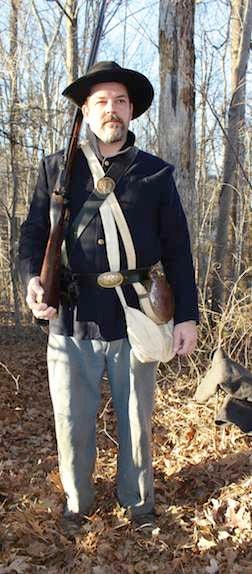Warren Davis can fight war for either side
Published 12:00 am Thursday, January 23, 2014
Over 150 years after the Civil War between the Confederate and Union broke out, reenactments of various battles are still played out for others to see. One of those actors, or re-enactors, is Warren Davis. Although he hails from Clemmons, Davis often travels to various parts of the state and Virginia to honor the men who fought so valiantly. He is a part of the 24th Virginia Infantry Regiment. “My love of history probably came from my dad. He was a World War II and Vietnam Veteran. He was also a history major,” Davis says.
Many love to attain the knowledge of history, but how did Davis decide he wanted to act it out? It was actually at a softball game. “I was playing softball for my church league. I overheard Brad Craver talk about reenactment. I asked him about it and he asked me if I was interested. The next thing I knew, I was in Bedford, Virginia.” Bedford used to be known as Liberty. Liberty saw action in the Civil War during General David Hunter’s raid in 1864. “It was a really neat experience for me and hooked me so to speak. Parts of Bedford appear to look today, at least in my mind, as it did back when it was known as Liberty. So that added to the overall experience.” Davis has two uniforms, one for a Union solider and the other for Confederate. There are many similarities in the two. Both were made of wool. Today, they are still made from wool in order to be as authentic to the times as possible, making it very hot for actors during the summer. Both sides carry the heavy rifles used during the 1800’s. They have canteens for water, a cartridge box, and cap box which stores necessities for the gun. However, two main differences lie in the color of the jacket. The Union wore navy blue and had belt buckles engraved with the letters “US.” The Confederates wore grey jackets. Often times, the Confederates would take the belt buckles off of dead soldiers and turn them upside down, which would look like an “SN,” for southern states. Once Davis put on his Union uniform and began to march in the streets of Liberty, he became immersed.
“One of the things that happened to me is something referred to in the reenactment world as, ‘seeing the elephant.’ You start to get tunnel vision. There are some re-enactors playing dead and when we retreated, I saw these people. It looked real.” Davis says the men all camp out in tents similar to the ones issued while marching or going to battle. Davis’ father has also camped out with Davis during reenactment excursions. “He enjoyed watching me enjoy myself. He didn’t care for the heat, because he was hot,” Davis chuckles. “But having my dad there was part of my experience.” Since that first experience ten years ago, Davis has been a part of many other Civil War reenactments, including the 145th and 150th at Gettysburg. Gettysburg is only reenacted every five years. “There is a big push to get as many re-enactors as possible for Gettysburg. At the 145th, we had 13,000 re-enactors and over the course of a three-day event, over 100,000 spectators.” The actors all drew a card. If you drew a death card,
Your Neighboryou knew to take a hit. However, if the actors are feeling sick from the heat, are tired, or out of ammunition, they can also fake a death.
Another tradition for the re-enactors is how they initiate the rookies. Davis recalls a time when one fellow came up to their camp after a day of reenactment and expressed some interest in participating. “We said, ‘alright’ and suited him up. When we have a rookie, there is a bit of a ceremony. They are introduced as a rookie and we poor black powder on his hand with water. They are told to smear it on their face. This way, everyone in the field knows he or she are brand new and know to help them.” Davis says others may find reenactment trivial, but he enjoys it. “Reenactment may seem silly, playing dead, but if you watch ‘Saving Private Ryan,’ all those people playing dead while storming the beaches of Normandy, those were re-enactors of WW II. Most of us are doing it as a way to honor our ancestors.” Davis too has come to discover that many of his ancestors, both on his mother and father’s side, fought in the Civil War. Our neighbor’s love for our country’s history through reenactment is reminiscent of a quote by Ulysses S. Grant, “I appreciate the fact, and am proud of it, that the attentions I am receiving are intended more for our country than for me personally.”
“Your Neighbor” is a feature by Jill Osborn. If you have a neighbor everybody should know, reach Jill at jill.n.osborn@gmail.com. Also follow her blog on parenting at MuchAdoAboutMothering.com/




